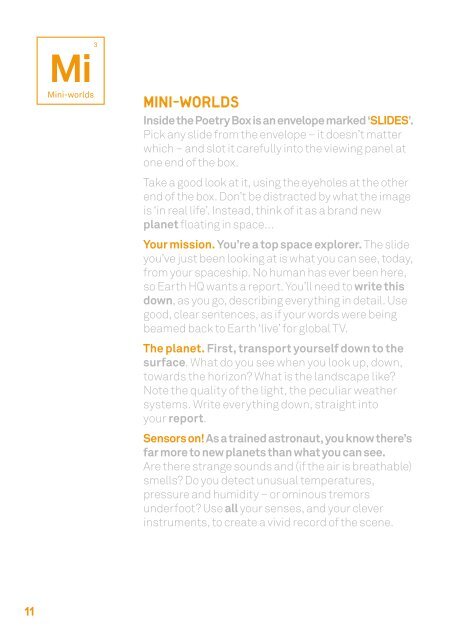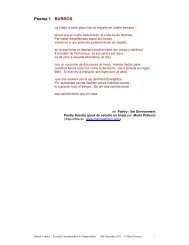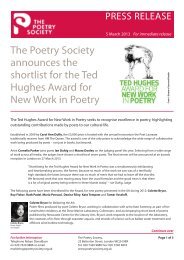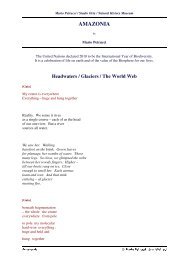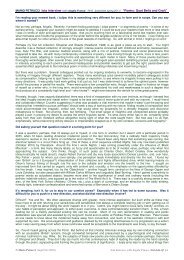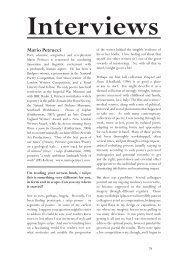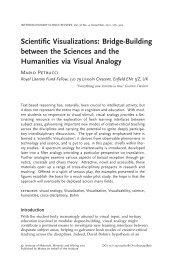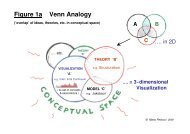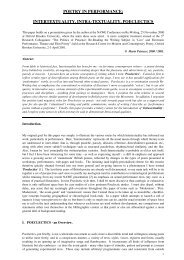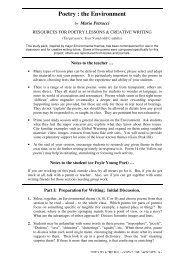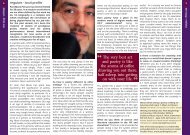Here - Mario Petrucci
Here - Mario Petrucci
Here - Mario Petrucci
Create successful ePaper yourself
Turn your PDF publications into a flip-book with our unique Google optimized e-Paper software.
11<br />
Mi3<br />
Mini-worlds<br />
MINI-WORLDS<br />
Inside the Poetry Box is an envelope marked ‘SLIDES’.<br />
Pick any slide from the envelope – it doesn’t matter<br />
which – and slot it carefully into the viewing panel at<br />
one end of the box.<br />
Take a good look at it, using the eyeholes at the other<br />
end of the box. Don’t be distracted by what the image<br />
is ‘in real life’. Instead, think of it as a brand new<br />
planet floating in space…<br />
Your mission. You’re a top space explorer. The slide<br />
you’ve just been looking at is what you can see, today,<br />
from your spaceship. No human has ever been here,<br />
so Earth HQ wants a report. You’ll need to write this<br />
down, as you go, describing everything in detail. Use<br />
good, clear sentences, as if your words were being<br />
beamed back to Earth ‘live’ for global TV.<br />
The planet. First, transport yourself down to the<br />
surface. What do you see when you look up, down,<br />
towards the horizon? What is the landscape like?<br />
Note the quality of the light, the peculiar weather<br />
systems. Write everything down, straight into<br />
your report.<br />
Sensors on! As a trained astronaut, you know there’s<br />
far more to new planets than what you can see.<br />
Are there strange sounds and (if the air is breathable)<br />
smells? Do you detect unusual temperatures,<br />
pressure and humidity – or ominous tremors<br />
underfoot? Use all your senses, and your clever<br />
instruments, to create a vivid record of the scene.<br />
S<br />
5<br />
Stanza<br />
Life? Decide quickly: is this planet a lot like Earth; or<br />
is it violent, barren or weird? Most importantly, does<br />
it support living things? (If so, they don’t have to be<br />
green aliens!) What about plants, animals? Are there<br />
bizarre forms of life that seem like science fiction?<br />
The incident. Suddenly, something dramatic<br />
happens. Describe the incident, in detail, in your<br />
report. If you’re still alive afterwards, add some final<br />
words on how your mission ends. Should earthlings<br />
visit this planet, or stay well clear?<br />
Name it. Does the planet already have a name? If not,<br />
as its discoverer you get to make one up. Does your<br />
name reflect the planet’s character or inhabitants in<br />
some way?<br />
Reporting back. When your report is complete,<br />
check it. Then read it to the rest of the group. Having<br />
read it out loud, are there any changes you’d now like<br />
to make?<br />
Finally… a poem. Turn the best bits of your report<br />
into a poem. It doesn’t have to rhyme! If it helps, stick<br />
to short lines and simple phrases. The poem’s title is<br />
the planet’s name.<br />
If you have time, pick another slide and do the exercise again<br />
for that new planet. Create a second report and poem.<br />
The images in the slides are produced at huge magnification<br />
(i.e. very close up). For those of you who really want to know<br />
what you were looking at, see back page.<br />
Ve7<br />
Verse<br />
12


